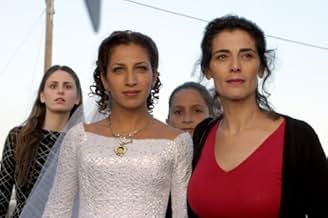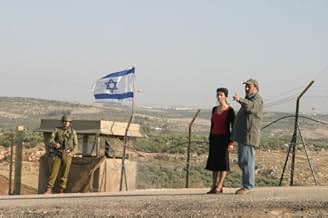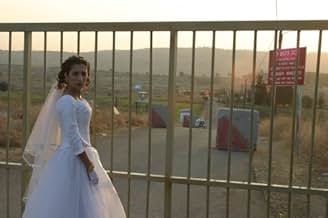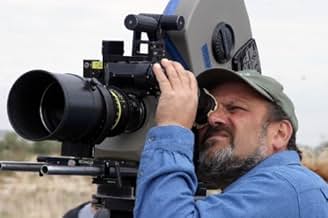The Syrian Bride
- 2004
- 1h 37min
Agrega una trama en tu idiomaIn Majdal Shams, the largest Druze village in Golan Heights on the Israeli-Syrian border, the Druze bride Mona is engaged to get married with Tallel, a television comedian that works in the ... Leer todoIn Majdal Shams, the largest Druze village in Golan Heights on the Israeli-Syrian border, the Druze bride Mona is engaged to get married with Tallel, a television comedian that works in the Revolution Studios in Damascus, Syria. They have never met each other because of the occup... Leer todoIn Majdal Shams, the largest Druze village in Golan Heights on the Israeli-Syrian border, the Druze bride Mona is engaged to get married with Tallel, a television comedian that works in the Revolution Studios in Damascus, Syria. They have never met each other because of the occupation of the area by Israel since 1967; when Mona moves to Syria, she will lose her undefi... Leer todo
- Dirección
- Guionistas
- Elenco
- Premios
- 8 premios ganados y 15 nominaciones en total
- Amal
- (as Hiyam Abbass)
- Hammed
- (as Makram J. Khoury)
- Marwan
- (as Ashraf Barhoum)
- Evelyna
- (as Evelyne Kaplun)
- Amin
- (as Adnan Trabshi)
- The Mother
- (as Marlene Bajjali)
- Simon
- (as Uri Gabriel)
- Joseph
- (as Robert Hoenig)
- Dirección
- Guionistas
- Todo el elenco y el equipo
- Producción, taquilla y más en IMDbPro
Opiniones destacadas
The acting is superb, especially that of Markam Khoury as the father of the bride, Hiyam Abbas as the independent older sister and, of course, Klara Khoury as the Syrian Bride herself. The movie is quadrolingual, and sorta has Hebrew take a back seat. It's mostly in Arabic, and also has some English, Russian and a few words of French. Most viewers will probably be doing quite a lot of reading (subtitles) in this movie, but it's worth it.
The year of 2004 was an amazingly productive one for Israeli cinema, and The Syrian Bride is no exception. You do not want to miss this one.
Mona (Clara Khoury), a young Druze bride is to be wed to Syrian TV-star Tallel (Derar Sliman) from Damascus, a man she has never met. Since neither country recognizes the other diplomatically, once the bride crosses the border to Syria, she will never be allowed to return to Israel and her wedding day, usually a day of great joy, may be one of her saddest. While the film tells us much about the sad realities of the political fragmentation in the Middle East, it is also a story with social and cultural ramifications. Mona's sister Amal (Hiyam Abbas), whose expressive face frames the film's beginning and end, is stuck in an unhappy marriage. She wants to attend Haifa University but is thwarted by her husband Amin (Adnan Trabshi) who is afraid of losing face in the village and of relinquishing "control".
Mona's father Hammed (Makram Khoury), a pro-Syrian agitator known to Israeli police, is forbidden to travel to the Syrian border to say goodbye to his daughter. He harbors resentment and refuses to welcome his son Hattem (Eyad Sheety) and his Russian wife home from Moscow because he broke family tradition and moved away eight years ago. Another son, Marwan (Ashraf Barhom), a businessman, is welcomed by the family but is rejected by an angry former girlfriend, a French Red Cross worker (Julie-Anne Roth), who works in the village. Mona's character is mostly symbolic and she has little to say, yet the story of the film is written on her face and her lack of dimensionality is more than compensated for by the depth of the supporting characters, particularly Hattem and Amal.
As these conflicts bubble under the surface, the situation becomes increasingly absurd as the wedding is threatened by bureaucratic intransigence on the border checkpoints between Israel and Syria. Mona's passport has an Israeli stamp on it and, according to Syrian regulations, anyone carrying a passport with an Israeli stamp is denied entry to Syria. Neither Israeli nor Syrian customs officials seem to know what to do and the prospective bride and groom are stuck in a no-man's land, reduced to communicating via bullhorns pressed against locked gates. The Syrian Bride may sound like an exercise in absurdity bordering on farce, yet for the family who may never see their child again, it is a drama of high seriousness. Whether you consider The Syrian Bride to be an allegory, black comedy, family drama, or political statement, the image of a girl sitting alone in a white wedding dress stuck between impenetrable barriers is one that remains.
The Druze are a minority within a minority. Most of them consider themselves Arab, but they are not truly Muslim--they have their own religion and their own rituals. Some Druze have more or less integrated themselves into Israeli society, but the family portrayed in the movie consider themselves Syrian. They demonstrate solidarity with the Syrians whom they can see and hear across the border. However, crossing the border into Syria is difficult, and returning is impossible.
While the Israelis and the Syrians soldiers eye each other with hostility across the barbed wire, Amal, a young woman--the very beautiful Hiam Abbass--is attempting to cross from the Golan Heights into Syria to marry a man she has never met. Because of the regulations, she will never see her family again. This sad and bizarre situation is played out against a backdrop of family antagonisms, bureaucratic incompetence, and petty malevolence. Amal's father Hammed--Makram Khoury--has to walk a fine line between saying goodbye to his daughter and resisting the Israeli military attempts to silence him. Hammed's other daughter, Mona--played by Khoury's real-life daughter Clara Khoury--is trapped in a loveless marriage, and is trying to simultaneously comfort her sister and achieve her own independence.
Nothing goes right, despite the efforts of a harassed U.N. official, who has seen her share of bizarre border incidents and by now has apparently accepted as commonplace the absolute madness taking place all around her.
There were a few comic elements in the movie, but I see it as a tragic film about a tragic situation. "When kings fall out, poor people tremble." The characters in this film are trapped in a toxic situation that they didn't create and can't control. As always, the wars of bullets and of words play themselves out in the lives of people who are simply trying to lead a reasonably normal and happy life.
Co-writers Suha Arraf (a Palestinian journalist) and Israeli director Eran Riklis pile almost too much on to this one Druze (Israeli Arab) family living in the occupied Golan Heights in order to make the personal political. The tensions, poignancy and symbolism of a wedding are heightened because when this bride leaves her home for her arranged marriage with a Syrian celebrity, she will not be able to return home.
Every complicated character has a complicated background, whether theirs or their parents' politics or their religiosity or their dress or their educational or romantic aspirations-- and is in a complicated relation to every other character and the authorities.
In addition to the return of prodigal sons from overseas, the larger community intrudes on the intra-family tensions, from robed tribal elders and the police who each bring warnings of proper behavior to a comical videographer. My dependency on English subtitles lessened some of the impact of hearing characters switch from Arabic to Hebrew to French to Russian to English to communicate, as part of the interactions are based on who can understand different languages and who can't. This complex in-gathering all symbolically happens the same day as a demonstration in support of the change over of power in Syria from the father the dictator to the son, while a flat tire leads to a crucial delay. The ubiquitous television, and government attention, however, is focused on the West Bank, making this border a forgotten zone as well as a no (wo)man's land.
What makes it all hang together amidst this human comedy is the central focus from the start to the finish on the almost silent bride, dressed in Western white, and her more verbal older sister, rebelliously in slacks, and both played by powerful actresses. Each has made choices in the past they regret and each chooses their future now, despite the efforts of all their male relatives, let alone global politics, to thwart them and make them helpless.
Even with the heavy-handed baggage of all the "Crash"-like coincidences, the film beautifully makes the point that politics isn't just ideology but affects how people get on with the basics of their lives.
"The Syrian Bride" was a surprise. Directed with honesty by Eran Riklis, who also co-wrote the screen play with Suha Arraf, the film takes no sides between one faction, or another. In many ways, the movie seems to be sympathetic toward the Druze family, but in no way it felt preachy, or frankness in its presentation of what goes on in that troubled part of the world.
The family at the center of the story is not a happy one. The father, Hammed, has been in prison for his pro-Syrian views. He has also estranged himself from his two sons, Hattem, who has married a Russian doctor and now lives abroad and Marwan, a businessman of sorts, based in Italy. The oldest daughter, Amal, a sensitive woman, has a troubled marriage herself to a man who can't understand her need to assert herself and go to college. It is a male dominated society where women don't seem to have much to contribute except have children and be housewives.
Most impressive in the film is Hiam Abbass, an actress we have admired from her previous work, notably, "Satin Rouge" and "Paradise Now". She has a quiet way of getting under the skin of the role she is playing; this woman shows such dignity in her work that it's hard to take ones eyes from her once she is on the screen. Makram Khoury is seen as the patriarch, Hammed. Clare Khoury is also effective as the bride who must leave family and friends to go to another world. Eyad Sheety and Ashraf Barhom play the two brothers.
"The Syrian Bride" is a satisfying film by Eran Riklis, a talented director who shows great sensibility toward the material.
¿Sabías que…?
- TriviaMakram Khoury and Clara Khoury are father and daughter in the film as well as in real life.
- ErroresMona's father says he has raised her for 25 years. However, she states her birth date as November 30th 1976 and the movie is set on July 17th 2000. That would make her only 23 years old.
- ConexionesFeatured in The Making of The Syrian Bride (2005)
- Bandas sonorasBride Theme
Music Composed & Conducted by Cyril Morin
Performed by Bulgarian Symphony Orchestra-Sif 309
Selecciones populares
- How long is Syrian Bride?Con tecnología de Alexa
Detalles
- Fecha de lanzamiento
- Países de origen
- Sitios oficiales
- Idiomas
- También se conoce como
- Syrian Bride
- Locaciones de filmación
- Productoras
- Ver más créditos de la compañía en IMDbPro
Taquilla
- Total en EE. UU. y Canadá
- USD 380,505
- Fin de semana de estreno en EE. UU. y Canadá
- USD 7,235
- 20 nov 2005
- Total a nivel mundial
- USD 1,522,967
- Tiempo de ejecución
- 1h 37min(97 min)
- Color
- Mezcla de sonido
- Relación de aspecto
- 2.35 : 1




















